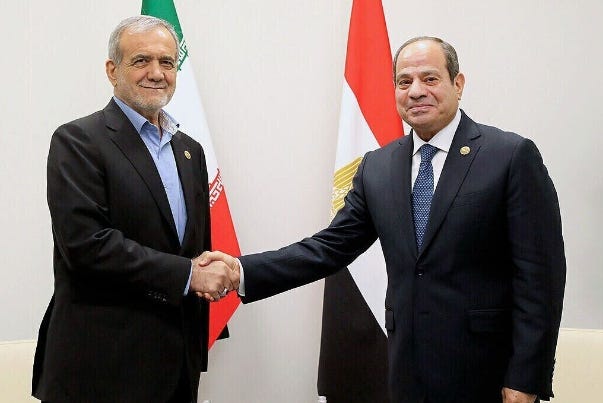Iran and Egypt: Navigating Mutual Wariness Amid Regime Change Concerns
Iran and Egypt share fears that their regimes are enroute to experience a regime change attempt and they are seeking to align their regional agendas in anticipation for rough times ahead.
The President of the Islamic Republic of Iran, Masoud Pezeshkian, visited Cairo on Wednesday 18 December to attend the 11th D-8 Summit, marking his first visit to Egypt in eleven years. The D-8, or the Organisation for Economic Cooperation, is an international initiative comprising Muslim-majority developing countries, and this year’s summit emphasised economic cooperation, private sector involvement, with a special focus on the theme: investing in youth. Trade value between member states has seen significant growth, more than doubling from $65 billion in 2016 to $133 billion in 2024, reflecting the organisation's ambition to reach $500 billion by 2030, a success Egypt aims to leverage to ensure regime security. Egyptian Foreign Minister Badr Abdelatty reiterated the “crucial” timing of the summit amidst unprecedented political volatility and economic challenges facing the region, and announced a special session would be held focused on Palestine and Lebanon.
Strained Egypt-Iran Relations
Egyptian officials stated that the visit aimed to strengthen bilateral relations, a goal accelerated by the China-backed Iran-Saudi rapprochement and the restoration of official relations, which the two countries have been working towards since March of last year, despite years of severed ties. Since then, two secret low-level talks were held in Baghdad, with efforts intensifying after 7 October; this October, Iranian Foreign Minister Abbas Araghchi visited Egypt ahead of the BRICS summit, marking the first such visit from an Iranian foreign minister in over a decade. These efforts culminated in this week's D-8 meeting, which provided an opportunity for the leaders to discuss the critical regional situation and explore potential pathways to peace. Egyptian President Abdel-Fattah el-Sisi also met with Lebanese officials to address such efforts to ease tensions, emphasising that Israel's actions in Gaza, Lebanon, and Syria are the root cause.
Preventing Spillover with Sisi Security
The historic Iranian visit comes one week after Israel's chief of staff and the head of the Shin Bet internal security agency visited Cairo to discuss the ousting of Assad and its regional implications. Tensions, exacerbated by Israel's war on Gaza, have now reached a boiling point with the recent ousting of former Syrian President Bashar al-Assad. The controversy surrounding the infamous Sednaya prison in Damascus has resonated deeply with the Egyptian public, with activists asserting that Egypt has its own version of Sednaya. These developments have been met with fear from the government, manifested in a lack of celebration on television and random arrests of Syrians in Egypt. Therefore, it can be assumed that the intensification of efforts towards economic cooperation and a peace process are preventative measures against a second wave of the Arab Spring, serving as a strategy to secure regime stability for Sisi.
Competing Regional Agendas
The 2021 "New Levant" initiative, a US-backed plan, involves the creation of an oil pipeline running from Iraq through Jordan to Egypt, alongside trilateral trade agreements. Although Iran initially welcomed the announcement of the plan, the "New Levant" initiative, like the India-Middle East-Europe Corridor (IMEC), is widely seen as an effort to reduce Iraq's dependence on Iran and limit Iranian influence in the region, while also decreasing Egypt and Jordan’s reliance on the Gulf Cooperation Council (GCC). Countries supporting IMEC, like Turkey, also back this initiative, aligning their efforts to promote regional stability and economic integration. Nevertheless, the plan has made limited progress, and current regional escalations threaten these ambitions, as Egypt appears to be seeking a stronger relationship with Iran to promote stability. Furthermore, as both countries are major members of BRICS, this blossoming relationship could serve as a catalyst for increased BRICS cooperation within the region, particularly in support of the Palestinian cause. Egyptian and Iranian officials met on the sidelines of the BRICS summit in October to discuss the same concerns regarding de-escalation and bilateral cooperation. Iran and Egypt share fears that their regimes are enroute to experience a regime change attempt and they are seeking to align their regional agendas in anticipation for rough times ahead.




